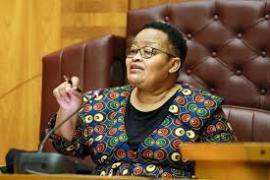

National Council of Provinces (NCOP) Vice-President Sylvia Lucas told delegates at the 68th annual Commission on the Status of Women (CSW68) that to advance gender transformation, councils needed to regularly assess prevailing gender norms in their communities.
This will ensure that policy interventions are targeted to each community and improve the efficiency of policies, she said.
Lucas spoke at the second session of the gathering on the theme “Gender-Sensitive Institutions to Break the Cycle of Poverty.”
In her speech, she said Parliament’s capacity to make legislation and policy interventions gender-sensitive was a key area for focus.
Parliament should also continue to build women’s capacity to advocate for gender-sensitive oversight and law-making processes in key areas such as development and transformation.
The Deputy Speaker will accompany the Speaker of Parliament, Nosiviwe Mapisa-Nqakula, to CSW68, organised by the Inter-Parliamentary Union (IPU) and UN Women, which runs until 22 March in New York.
Lucas said Parliament has a key role to play in reducing poverty through gender transformation by enacting laws that are gender sensitive and well-crafted to break down gender regressive norms and behaviours across society.
“As we work towards achieving gender transformation, we must continue to adhere to existing international and national protocols and legal frameworks, including prescriptive norms on gender transformation, which can be used to strategically shape policymaking and advance gender equality,” she said.
Lucas told the session that South Africa recently adopted the 2021 Charter for Accelerating Women’s Development. The charter is based on international best practices and was mandated by South African women. It outlines areas where parliamentary intervention in policies, laws and programmes is crucial. The goal of the charter is to meaningfully advance gender transformation and reduce poverty.
“To this end, key policy areas highlighted through the Women’s Charter review process include recommendations for reform of budgetary policy, including macroeconomic policy, the Monetary Bill, fiscal policy and tax law, which we believe are key areas requiring continued and sophisticated analysis and reform.”
“These policies and legislative instruments, if reformed to be more gender-sensitive in form, style and content, could be effective tools in achieving poverty reduction and gender transformation objectives,” Lucas said.
Lucas said capacity and resources that Parliament must continue to invest in include improving gender-sensitive budget analysis capacity and legislation, gender-sensitive oversight and oversight agenda setting, and the ability to use gender-disaggregated data to shape budget decisions and commitments. – SAnews.gov.za
Tara Thomas Agency stands at the forefront of the entertainment industry, with years of experience dedicated to nurturing the most exceptional talents and successful acts.